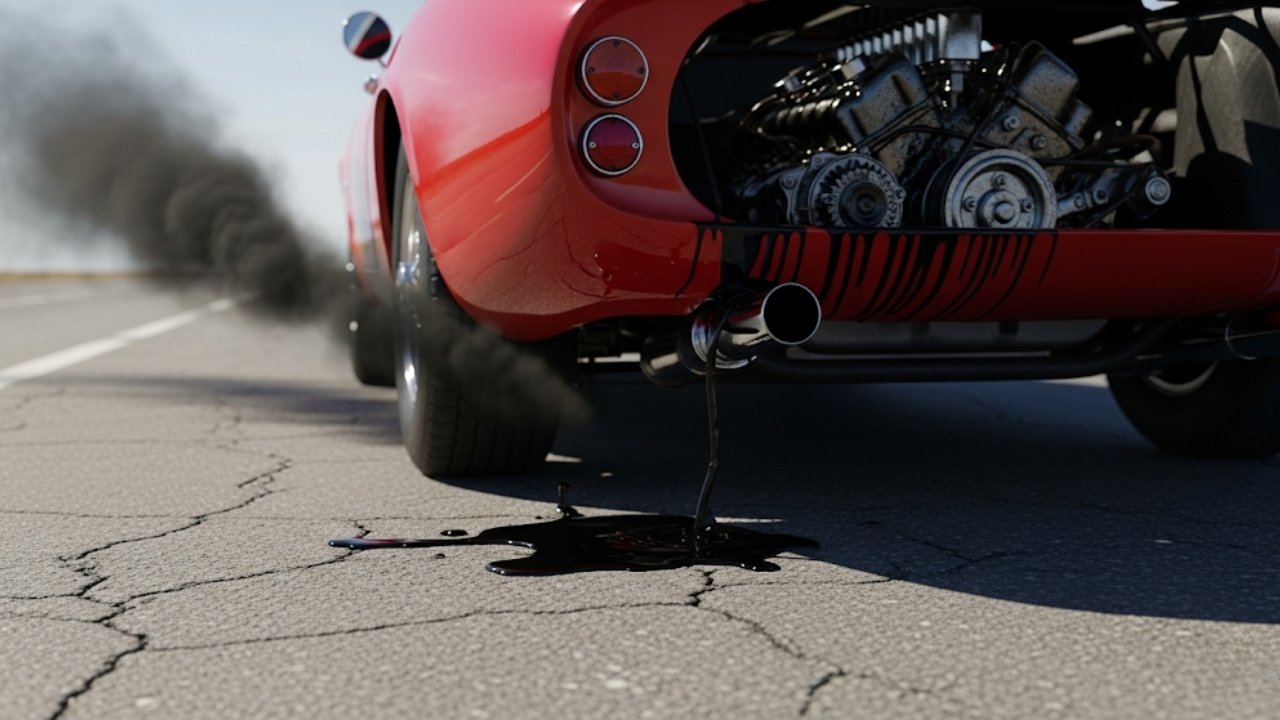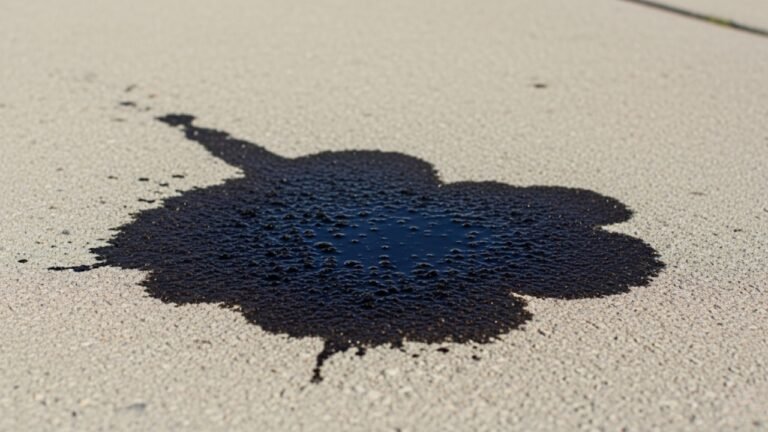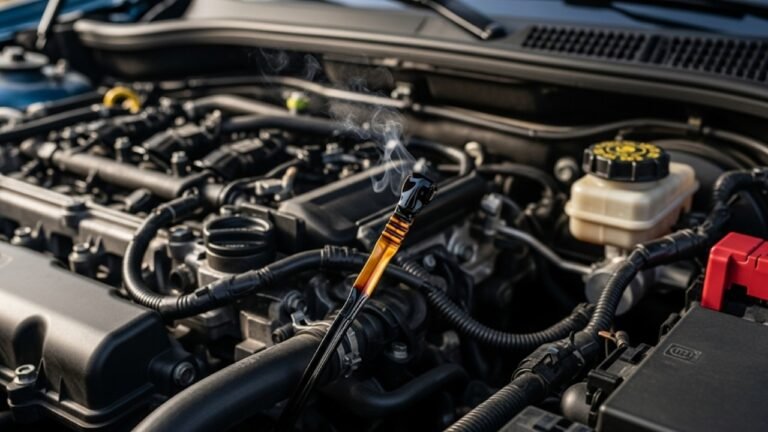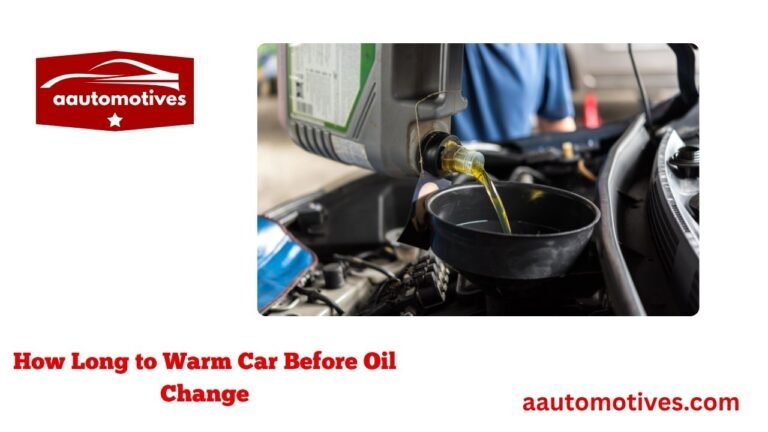Why Your Car Leaks Oil While Running: Causes, Fixes, and Tips

Ever pulled into your driveway, parked your car, and noticed a dark puddle forming underneath? It’s frustrating, right? You think, “Great, another issue I have to deal with.” A car that leaks oil while running is more than just a messy problem—it could be a sign of something deeper going wrong under the hood. I’ve been there, trust me. One day, I was on my way to work when I smelled something burning. When I got out, I saw a black trail leading back from where I parked. That moment made me realize how serious an oil leak can be.
But you’re not alone. Thousands of people face this issue every day. The key is understanding what causes it, what it means for your engine, and how you can fix it before it turns into a bigger problem.
In this guide, we’ll break everything down—from common causes and warning signs to practical solutions. So, grab a coffee and let’s dive in.
In This Article
- 1 What Does It Mean When Your Car Leaks Oil While Running?
- 2 Top Reasons Why a Car Leaks Oil While Running
- 3 3. Loose or Damaged Oil Filter and Drain Plug
- 4 4. Cracked Oil Pan or Engine Block
- 5 5. Failed PCV Valve (Positive Crankcase Ventilation)
- 6 What Does an Oil Leak Look and Smell Like?
- 7 Can You Still Drive If Your Car Leaks Oil While Running?
- 8 How to Fix an Oil Leak While the Car is Running
- 9 ✅ Bullet Summary: Steps to Take if Your Car Leaks Oil While Running
- 10 How to Prevent Oil Leaks from Happening in the First Place
- 11 Cost of Repair: What Should You Expect to Pay?
- 12 A Personal Story: When I Ignored the Leak (And Paid the Price)
- 13 FAQs About Oil Leaks While Running
- 13.1 1. Why does my car leak oil only when the engine is hot?
- 13.2 2. Is it safe to drive a car that leaks oil while running?
- 13.3 3. Can I use stop leak products to fix the issue?
- 13.4 4. How do I know if the oil leak is serious?
- 13.5 5. What type of mechanic should I see for an oil leak?
- 13.6 6. How long can I drive with an oil leak while running?
- 13.7 7. Can oil leaks cause engine fires?
- 13.8 8. Will an oil leak fail my car’s inspection or emissions test?
- 14 Final Thoughts: Don’t Let a Leak Turn into a Loss
What Does It Mean When Your Car Leaks Oil While Running?

Oil in your car acts like blood in your body. It lubricates, cools, and protects moving parts. When it leaks while the engine is running, those parts can wear down quickly. You might also notice smoke, a burning smell, or even lower fuel efficiency.
Here’s what makes this problem tricky:
-
The leak might only happen when the engine is hot.
-
It could stop once the car cools down.
-
You might not see any puddles after parking.
-
The leak can worsen if ignored—even causing engine failure.
So, if you’re wondering why it’s only leaking when you drive, you’re asking the right question. And we’ll explore the answers in the next section.
Top Reasons Why a Car Leaks Oil While Running
There isn’t a one-size-fits-all reason why this happens. But over the years, I’ve noticed certain culprits pop up again and again. Let’s go through the most common ones.
1. Worn-Out Gaskets and Seals
Engine gaskets and seals are supposed to keep oil inside. But with time, heat, and wear, they harden or crack. Once they do, oil starts leaking—especially under engine pressure.
Common problem areas include:
-
Valve cover gasket
-
Oil pan gasket
-
Timing cover seal
-
Camshaft and crankshaft seals
If these parts are old or damaged, they can cause your car to leak oil while running, especially after long drives or high speeds.
2. High Oil Pressure
Modern engines work under high oil pressure to ensure proper lubrication. But if that pressure spikes—maybe due to a clogged filter or blocked PCV valve—it can push oil past seals that normally hold tight.
You’ll usually notice this during acceleration, hill climbs, or highway driving. That’s when the leak becomes obvious.
3. Loose or Damaged Oil Filter and Drain Plug
Sometimes, it’s the small things. An oil filter that wasn’t tightened properly or a stripped drain plug can be enough to cause a leak. And since the oil pump keeps pushing oil through the system while driving, it can leak significantly if these components are faulty.
Watch out for:
-
Oil splashed near the filter
-
Drips forming under the engine after driving
-
Low oil levels right after an oil change
4. Cracked Oil Pan or Engine Block
This one’s rare but serious. If your oil pan is cracked—maybe from hitting a speed bump too hard or driving over debris—oil will seep out while the engine runs.
And if the engine block itself has a crack (usually due to overheating), it’s game over unless you repair or replace it. These leaks tend to get worse over time and might show up as burning smells or visible smoke.
5. Failed PCV Valve (Positive Crankcase Ventilation)
Your PCV valve helps regulate internal pressure and directs excess gases back into the engine. If it clogs or malfunctions, pressure builds up inside the crankcase. Eventually, the pressure forces oil out through weak points like seals and gaskets.
In this case, your car leaks oil while running and may even blow white smoke from the tailpipe.
Quick Table: Common Causes and Symptoms
| Cause | When It Happens | Symptoms |
|---|---|---|
| Valve Cover Gasket Leak | While driving or idling | Burning smell, oil on engine |
| High Oil Pressure | At high speeds | Sudden leaks, oil loss |
| Loose Drain Plug or Filter | After oil change | Dripping oil under car |
| Cracked Oil Pan | After impact | Oil splatter, engine noise |
| Failed PCV Valve | While running | Rough idle, smoke, oil leaks |
| Rear Main Seal Leak | Engine running | Major oil loss, often near flywheel |
What Does an Oil Leak Look and Smell Like?
You might be wondering: how can I even tell if my car’s leaking oil while running?
Here’s a short checklist based on what I’ve personally noticed:
-
Look under the car right after driving. If there’s a puddle forming within 5–10 minutes, it’s likely engine oil.
-
Smell something burning when you stop at a traffic light or after a drive? That’s probably oil dripping on the hot exhaust.
-
Smoke from under the hood or near the back of the engine? That’s a clear sign.
-
Check your oil dipstick—if it’s low after just a day or two, you’re losing oil somewhere.
The color also matters. Engine oil is usually amber or dark brown. If it’s reddish, it’s transmission fluid. Black and greasy? Probably engine oil.
Can You Still Drive If Your Car Leaks Oil While Running?
This is a common question—and a dangerous one. I’ve had friends say, “It’s just a small leak; I’ll deal with it later.” Big mistake.
Driving a car that leaks oil can lead to:
-
Engine overheating
-
Friction damage to internal parts
-
Fire risk if oil hits the exhaust
-
Engine seizure, which is usually fatal for the motor
If it’s a very slow leak, you might get away with topping off the oil for a few days. But this is a temporary patch, not a fix.
✅ Warning Signs You Should Never Ignore
Here are some signs that mean you need to stop driving and address the issue immediately:
-
Oil pressure warning light is on
-
You hear knocking or ticking from the engine
-
There’s thick smoke coming from the engine bay
-
The smell of burning oil is strong inside the cabin
If any of these happen, pull over and turn the engine off. It’s not worth risking your safety—or your car’s life.
How to Fix an Oil Leak While the Car is Running
Fixing a leak depends on the cause, but let’s cover a few general approaches first:
️ Temporary Fixes (For Emergencies Only)
-
Use oil stop leak additives to swell seals temporarily.
-
Try high-mileage motor oils with conditioners that slow leaks.
-
Carry extra oil and check levels often if you must drive short distances.
But remember: these are short-term solutions.
Permanent Fixes (What Actually Works)
Here’s what you’ll need to do, depending on the issue:
-
Replace worn gaskets (valve cover, oil pan, rear main seal)
-
Fix or replace a cracked oil pan
-
Install a new PCV valve
-
Ensure drain plug and oil filter are tightened properly
-
Get a full oil system inspection from a mechanic
✅ Bullet Summary: Steps to Take if Your Car Leaks Oil While Running
-
Don’t ignore the leak, even if it looks small.
-
Check the oil level immediately.
-
Use cardboard or paper under the car to monitor the drip pattern.
-
Look for visible signs—smoke, puddles, strong smells.
-
Visit a mechanic or DIY the fix if you’re experienced.
How to Prevent Oil Leaks from Happening in the First Place
Let’s be honest: prevention is always cheaper than repair. A few basic habits can save you thousands of dollars and a lot of headaches. Here are the most effective ways to prevent a situation where your car leaks oil while running.
Stick to a Regular Oil Change Schedule
Changing your oil regularly ensures it stays clean and viscous. Dirty oil thickens and can clog small oil passages, which increases pressure inside the engine. That pressure can force oil past seals and gaskets.
Follow your car manufacturer’s guidelines—usually every 3,000 to 5,000 miles for conventional oil, and up to 7,500 miles for synthetic.
Inspect Seals and Gaskets During Service
Whenever you’re getting a service—oil change, tire rotation, or brake work—ask the mechanic to take a quick look at your valve cover gasket and oil pan gasket. If they’re brittle or starting to crack, replace them early before a leak begins.
Keep an Eye on Oil Levels
Make it a habit to check your oil level once a week or before any long trip. If you notice it dropping even a little, monitor it closely. A slow leak today could be a serious oil loss tomorrow.
Avoid Overheating Your Engine
Heat causes gaskets to expand and contract. Too much heat, too often, breaks them down. So, make sure your cooling system is in top shape—radiator, thermostat, and coolant levels all matter.
Cost of Repair: What Should You Expect to Pay?
One of the first things that goes through anyone’s mind is: “How much will this cost me?”
The price can vary widely depending on the part that’s leaking and your car’s make and model. Here’s a breakdown:
| Component | Estimated Cost (USD) |
|---|---|
| Valve Cover Gasket | $100 – $350 |
| Oil Pan Gasket | $150 – $600 |
| Rear Main Seal | $500 – $1,500+ |
| PCV Valve Replacement | $75 – $200 |
| Oil Filter or Drain Plug | $20 – $50 |
| Crack in Oil Pan | $300 – $900 |
If you catch it early, the fix is often affordable. But let it go too long, and it may lead to engine damage, which can cost thousands to repair or replace.
A Personal Story: When I Ignored the Leak (And Paid the Price)
I once had a 2012 Honda Accord that started showing small oil spots on the garage floor. I shrugged it off. “It’s old, they all leak a little,” I told myself. Then one morning, while driving to work, the engine suddenly made a ticking noise. The oil light came on, and I barely made it to the side of the road.
Turns out, the rear main seal had failed completely. I had been losing oil faster than I realized. By the time I got to a mechanic, the engine was running dry. Final bill? $1,800. That experience taught me that ignoring when a car leaks oil while running is not worth it.
FAQs About Oil Leaks While Running
1. Why does my car leak oil only when the engine is hot?
Heat causes the engine and its parts to expand. If seals or gaskets are weak, they may only leak when this expansion happens—usually when the engine is hot and running.
2. Is it safe to drive a car that leaks oil while running?
Not really. Even if the leak is small, driving can worsen it. You risk damaging your engine, overheating, or even causing a fire if oil touches hot parts like the exhaust manifold.
3. Can I use stop leak products to fix the issue?
Oil stop leak additives can work temporarily for small leaks. They help swell old seals, slowing the leak. But they’re not a long-term solution. Eventually, the part will need replacement.
4. How do I know if the oil leak is serious?
If you see thick smoke, smell burnt oil, or notice rapid drops in your oil level, it’s serious. A ticking engine or low oil pressure light are also danger signs. Get it checked immediately.
5. What type of mechanic should I see for an oil leak?
Go to an ASE-certified mechanic or a reputable repair shop. Look for someone experienced with your car’s make and model, especially if the leak is in a tough spot like the rear main seal.
6. How long can I drive with an oil leak while running?
Not long. If you’re topping off oil constantly just to keep driving, you’re buying time—but not much. A day or two at most, and only for short, essential trips. Better to fix it quickly.
7. Can oil leaks cause engine fires?
Yes, especially if the oil lands on a hot component like the exhaust manifold. It can smoke, catch fire, and damage your car—or worse, put your safety at risk.
8. Will an oil leak fail my car’s inspection or emissions test?
In many places, yes. An active oil leak can be grounds for a failed safety inspection. Plus, it could affect emissions if it impacts engine combustion or causes oil to burn.
Final Thoughts: Don’t Let a Leak Turn into a Loss
We’ve all got busy lives. It’s easy to put off little things like checking for oil spots or following up on that weird burning smell. But when your car leaks oil while running, it’s not a small problem—it’s a warning sign.
By acting early, staying on top of maintenance, and understanding what causes these leaks, you can avoid major repairs, stay safer on the road, and extend the life of your engine.
Think of your car like a close friend—it gives you rides, keeps you warm in winter, and gets you to work on time. When it’s leaking, it’s crying out for help. So listen, check under the hood, and take care of it before the issue snowballs.
And if you ever catch yourself wondering why your car is dripping oil mid-drive—now, you know what to do.






